

Late on Thursday afternoon I headed to Hoboken New Jersey to catch a train home. From the boardwalk beside the terminal I waved farewell to NYC and LegalTech 2018. As we departed, the Legalweek app on my phone sent a final notification: “It’s a wrap!”
The last day of the event started with a keynote panel about fake news. This topic seemed relevant to those who follow machine learning, language processing and related AI technologies.
Panelists addressed, and at times debated, the question of why a tech titan like Facebook is struggling with fake news on its platform. Charles J. Glasser, Jr. Esq. from NYU opened the discussion by stating that fake news should be easy to spot. For example, when the source never issues corrections and retractions, it should not be considered trustworthy.
Aaron Sharockman, executive director at Politifact pointed out that his company employs hundreds of human fact-checkers, and even when a story is flagged as fake, it is not removed by Facebook, merely marked as possibly incorrect. That human intervention was necessary, echoed a theme I heard at other presentations and from several companies over the last few days: Machines are here to partner with human counterparts on legal work, not to replace them.

Following the keynote I was able to spend time on the trade floor speaking with exhibitors and attendees to learn what they thought of Legalweek.
The broad consensus was that the show was a success, offering many opportunities for meeting new potential customers, partners and vendors. Attorneys I spoke to noted the emphasis on technology, and some cited continued concerns about how the industry is transforming and changing their jobs.
They were seeking to learn more about these trends at the conference’s many educational sessions. Other lawyers in attendance were more practical, and discussed how they were looking for solutions to very specific problems including data analysis, and the application of machine learning to ‘analog’ case files. One litigator I spoke with mentioned by way of example that his firm’s matters included laws drafted in 1875, requiring translation from the English used in the 19th century to its modern equivalent.
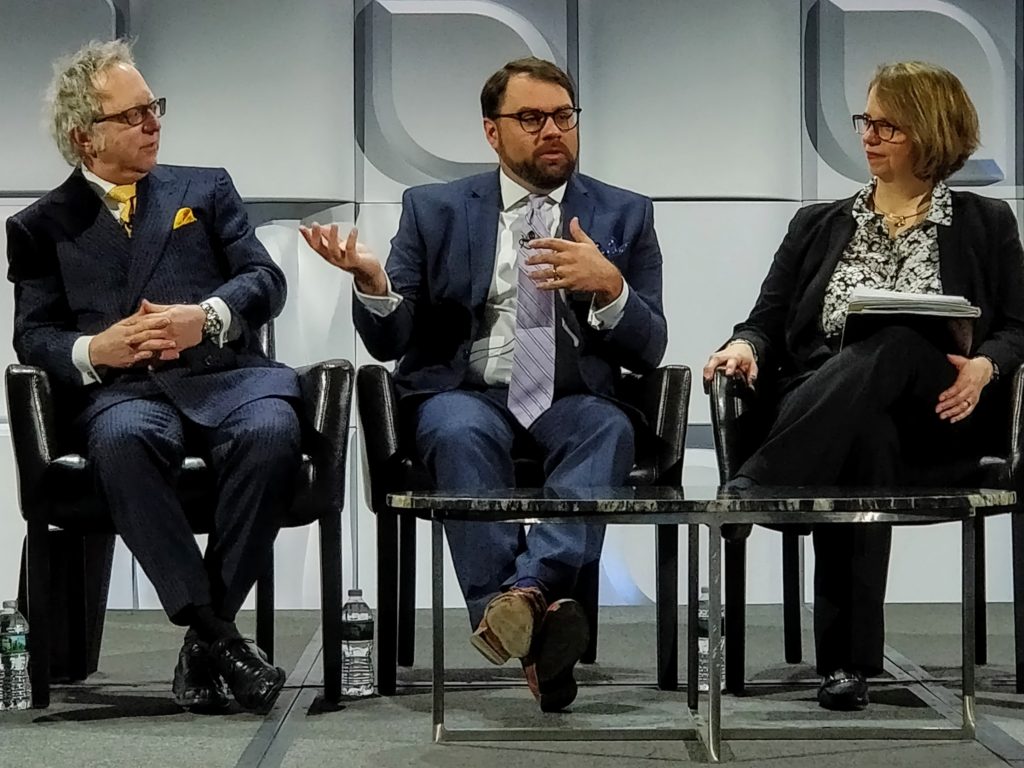
I visited a number of the vendors I first met on Legalweek’s opening day, Tuesday. Several offered feedback about the show.
Eben Adams, VP of growth and partnerships at LegalSifter got right to the point when I asked how the event went for their firm: “Legalweek 2018 was tremendous. LegalSifter came to New York City to spread the word about “combined intelligence” – creating scale for lawyers by complementing their legal expertise with our technology, generating new revenue for law firms.” In fact, I observed a continuous stream of people viewing LegalSifter’s demos on every occasion that I passed by their booth.
Anand Babu from Surukam offered a different view from the third floor of the show, stating that the crowd was “slim” and not as big as he’d seen in 2017. He offered an assessment of the situation: Increased competition and adoption of AI for contract analytics had made the technology less exciting than when it was new. The good news in this situation was that clients were moving from exploration to implementation.
Shmuli Goldberg, VP of marketing at LawGeex, went a step further. He stated that implementation was already in the rearview mirror, and that his company was now seeing growth. He deemed Legalweek 2018 to be a success. Another vendor sharing this view was NexLP; Alec Wakeley offered that the show was great for his company, as they had booked many demos of their AI analytics tool. The feedback from attendees had been positive too, according to him.
Martijn Migchelsen and Arnold Daniels from LegalThingsOne, were equally positive. “The show has been great, people are engaged and enthusiastic,” said Migchelsen. Daniels pointed out that in the U.S. the focus appeared to be mainly on AI, with LegalThingsOne being one of the only vendors at the show focused on blockchain. He and Migchelsen predicted that LegalTech 2019 would be very different, with more adoption of distributed ledger technology in the U.S. legal space coming soon.
As for me, I came away with an enormous stack of business cards from people I plan to reconnect with in coming weeks. The show was energetic, educational, and exhausting. Thank goodness it’s Friday!
—
Another great report, Ari! I’m sure all Artificial Lawyer readers will agree that you have done a fantastic job of covering New York Legal Tech 18 from start to finish. Thank you!
And now, the conference from an entirely different perspective, this time from Benjamin Chiriboga, the founder of legal business growth consultancy Legal Client Funnels, who covered days one and three.
Ben also kindly conducted an excellent survey of the attendees with regard to several legal tech adoption issues and his results are set out below for all to consider. Take it away, Ben!
—
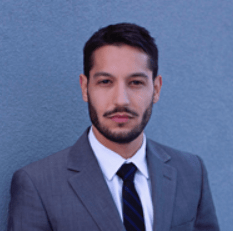
As a New Yorker, you tend to know a couple of things are always going to be true, no matter what.
For example, you know it’s always better to bring gloves with you on a January day (no matter what the weatherman says) as the weather can turn in New York pretty quickly.
You also know that the uptown F train will never, even on its best day, be empty or on time at 9 am – if running at all.
As I rode the F train uptown, sandwiched in between a construction worker and someone’s bagel – no gloves (my fault) – on a cold January day, unlike most other days, I couldn’t have been happier.
Because unlike most other cold January days, LegalWeek had arrived. What follows is my very from the cuff review of LegalWeek 2018 – which I hope paints an accurate picture of how it went down, without the benefit of 20/20 hindsight. Let’s proceed.
Day 1
It was a roaring start to LegalWeek NYC.
As a practicing attorney-turned-marketing consultant attending LegalWeek for the first time since moving to New York City in 2016, I was anxious to dig in and really get a sense of where my profession was going in the wake of the sweeping technological and business model changes we’ve seen over the last couple of years.
For years there have been cries of innovation and the need for lawyers to “get with it”. We’ve heard this forever and so the open question to be resolved was, “what’s new this time?”
It is no secret we are in a very interesting time. If you’ve followed legal innovation you know what’s at stake – disruption, collaboration and competition are all flirting with one another in an evolutionary menagerie, unlike anything our profession has ever seen.
For me, the most interesting news story of Q4 was Nick Bruch’s (of ALM) piece about DXC Technology’s licensing of its legal department to UnitedLex. This was one of the more aggressive tactics taken to date.
Running inside just as the doors closed, from the Keynote stage on Level 2, Nick Bruch and his co-panelist got right to business kicking off Day 1, hour 1, delving head first into THE topic du jour on everyone’s mind:
WHO IS WINNING, WHO IS LOSING AND WHAT IS GOING TO HAPPEN?
Legal Week had started.
In a way, Bruch and company really set the tone for the entire conference.
We know directionally that ALSPs, LegalTech and New Law are taking a bite out of traditional law firm models, the billable hour and everything else Big Law bets on, such as scale effects. However, as Nick Bruch and company summarized, where the trend is going and what sort of ceiling can be reached is anyone’s guess. That’s because – as in life – the trends and data suggest an interesting paradox.
Fun fact, PPP (profit per partner) was up – way up – in 2017, despite all the cries we all consistently hear about, “the need for innovation”.
How is this the case? If the pain is “there” why aren’t B2B and B2C consumers flexing their “customer power” that drives PPP down?
For market players the nugget of wisdom seems obvious: we don’t know when the levee will break, but we know it is resting on unsteady infrastructure.
As the hall doors opened up following the last words from ex-Homeland Security Director Jeh Johnson’s speech, that message from Bruch and company seemed to pervade the rest of the show and color the conversation that would follow at workshops and in between the players, vendors and sales convos that would follow.
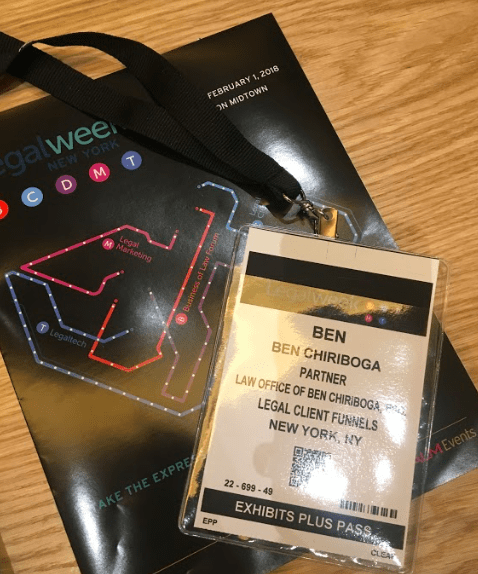
When I wasn’t popping into workshops or looking for free coffee over the course of the next two days, I found myself spending most of my time in and around the vendor pits.
Perhaps it’s confirmation bias, but ever since my high school science teacher introduced me to the Pareto Principle, I tend to see the famous 80/20 distribution principle everywhere I look.
For those unfamiliar, the Pareto Principle says, roughly, that 20% of a distribution will typically account for 80% of Y, i.e. in Pareto’s Renaissance Italy, the principle accounted for the fact that 80% of the land was held by just 20% of the aristocratic families in Italy, at the time.
And such was the case at LegalWeek with just 80% of the true innovation coming from just 20% of the participants in that for every AI-enabled, automated contract drafting solution, there were five fairly similar case management/e-discovery systems on the vendor floor – all robust, powerful and wonderful – but nevertheless similar in application.
This makes sense. From a macro level, Legal Tech continues to run and gun to find its place and purpose in the uncertain legal world with the open question being: how and what will lawyers, law firms, and legal departments TRULY need and adapt to, once innovation and workflow process DO phase shift and evolve?
It’s an open question not yet answered and so entrepreneurs are keeping pace with what’s working and driving market demand. Borrowing from product management language, it seems the overall lay of the land is that Legal Tech – while maturing and flexing its power – remains somewhere in between problem-solution and product market fit.
It’s anyone’s guess where it settles once the dust clears, however over the two days that I spent in and out of the vendor pit, the takeaway is that LegalTech is a strong, forward-looking industry. It’s encouraging.
Moving to the breakout sessions, it’s interesting to see the open way that those speaking from a leadership perspective continue to lead from.
The cards are on the table with an overall message from practioners that: “Hey, we don’t have all the answers and our institutions and departments are really figuring all of this out as well”.
This openness set a healthy framework for workshopping and collaborative engagement and many of the workshops and presentations I participated in were a great back and forth framed as a “this is what we are seeing” effort.
Zooming out again, who could have predicted just 10 years ago, procurement professionals sitting next to CIOs discussing how they were building legal business departments and that the metrics they were holding their teams to – a new language – were truly applied?
But, noticeably absent from the conversation about implementation were actual practicing law firm partners. [ Ed. good point, Ben, always too few senior partners at legal tech events….]
Day 3
New York is a tough place to live.
Noisy, busy and always running on coffee, throw in a 3-day legal blitzkrieg and it’s enough to make you start planning your next upstate trip.
This is why I spent my last day conducting a survey to try and tease out some macro opinions, data points and finer points from the Week’s participants and move them from talking about their solution and pitches to their opinions and perspective.
It’s my pleasure to present the results to you now. [The results are below and were produced by Benjamin Chiriboga, the founder of Legal Client Funnels.]
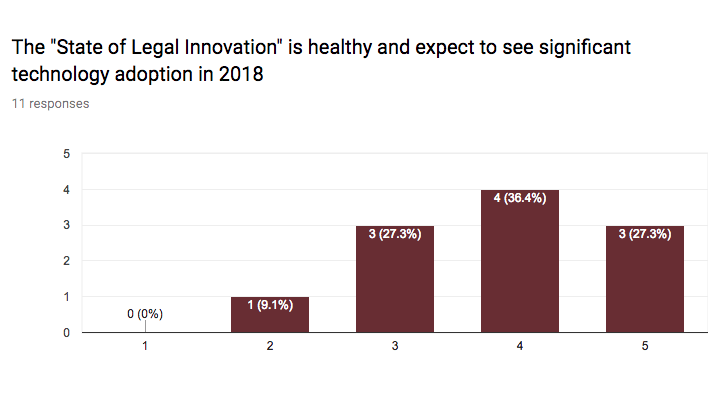
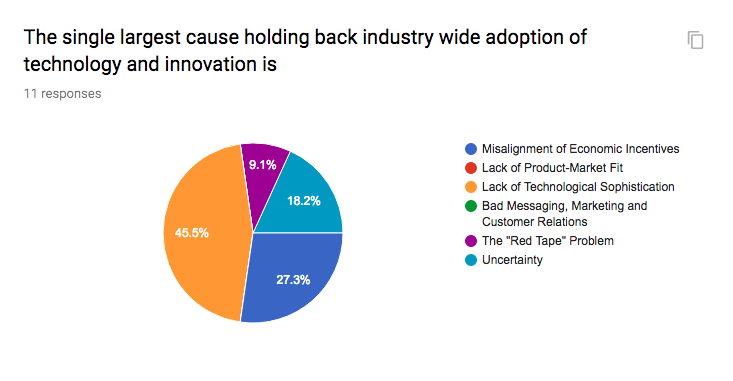
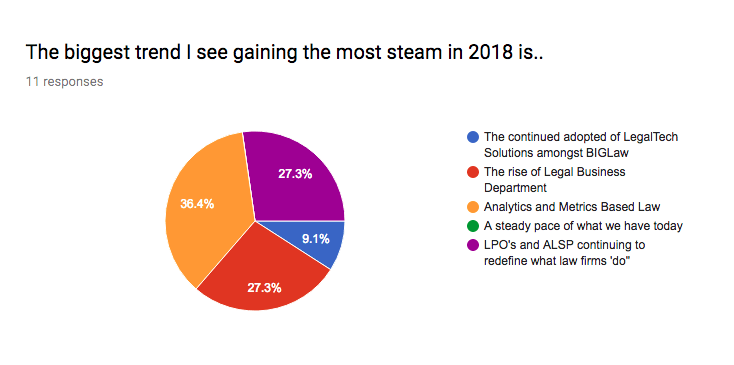
But before I go, I want to conclude by thanking everyone I met and a special thanks to those that took the time to speak with me one-on-one and provide a true education, including the teams at EverChron, LawGeex, LegalShifter, Case.One, Tali, Legito, FiscalNote, PartnerVine, FileVine, Onna and LegalThingsOne.
N.B. and a special thanks to Shmuli Goldberg of LawGeex and Jordan and Elizabeth Urstadt of PartnerVine, who were nice enough to take significant personal time with me, despite the waiting lines hoping to speak with them.
Until next time.